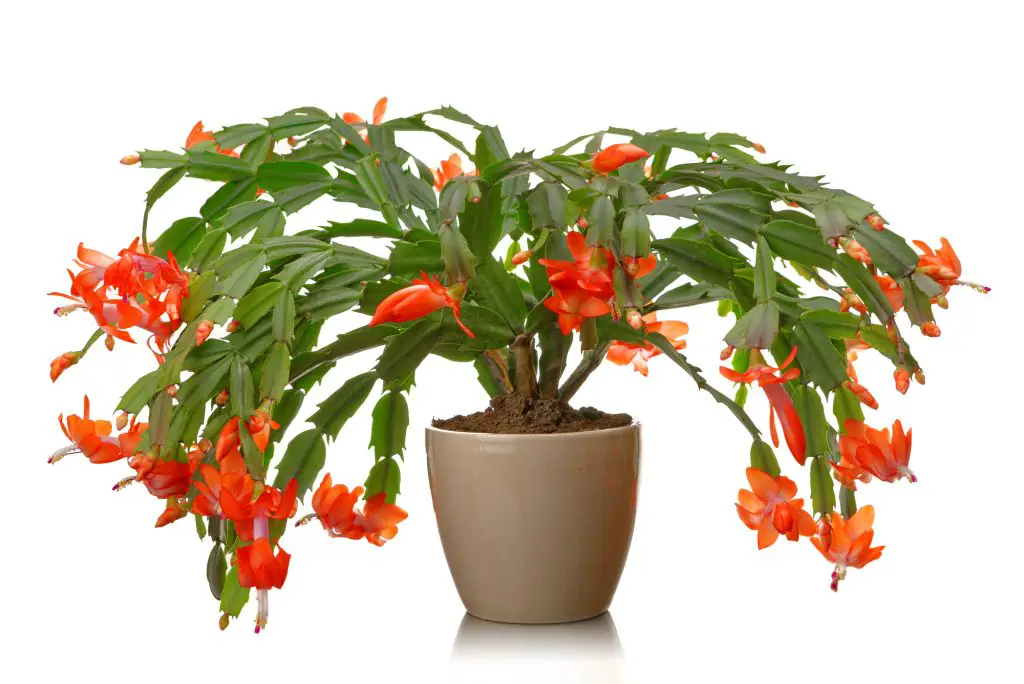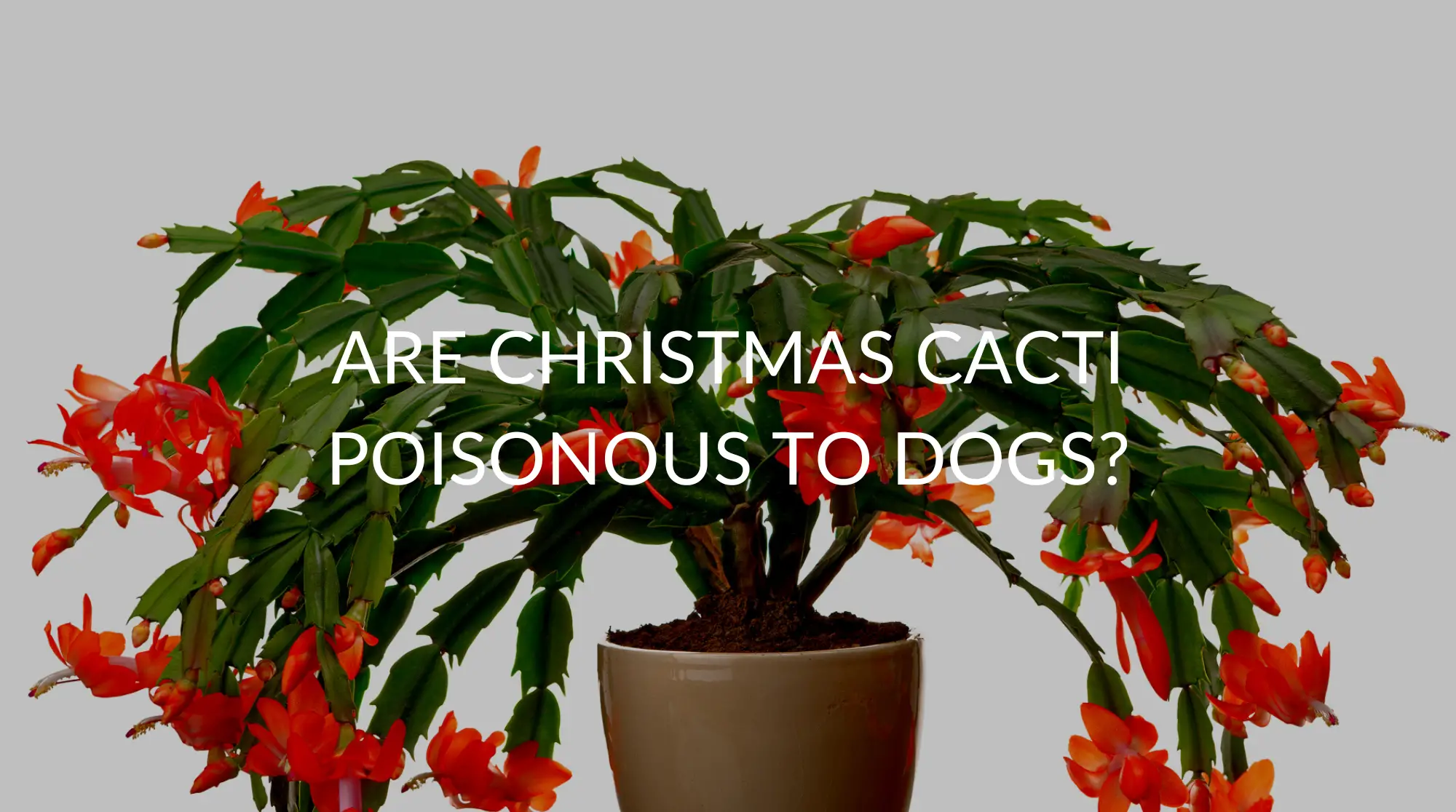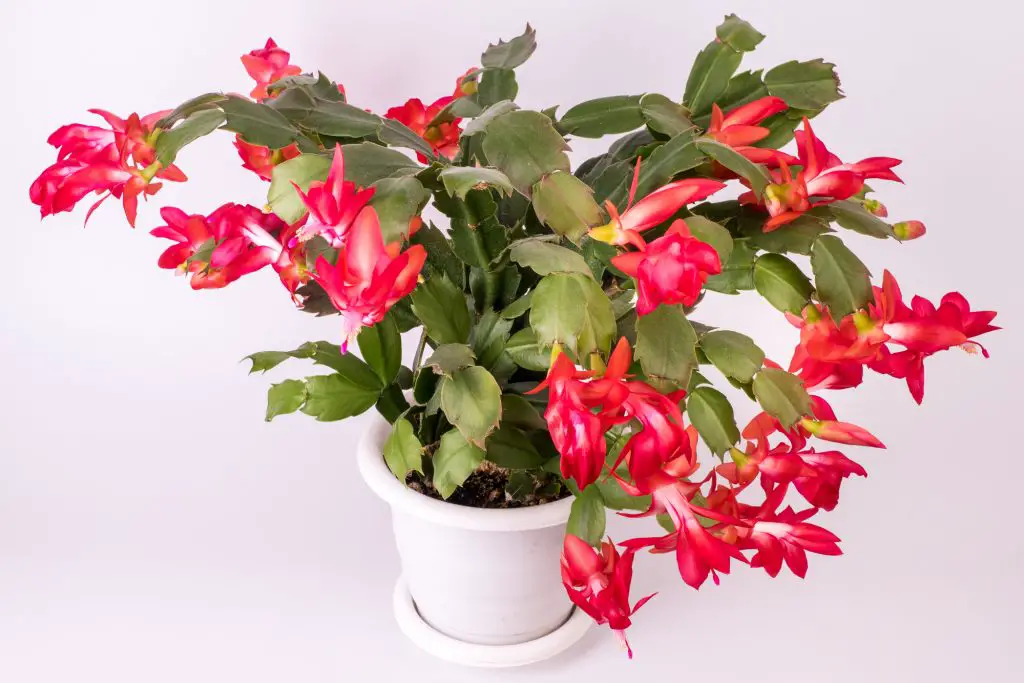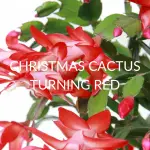The Schlumbergera x buckleyi, also known as the ‘Christmas Cactus’, is a lovely little Brazilian cactus that has gained popularity over the years, and understandably so. It’s beautiful, safe to handle, and relatively easy to take care of.
If you own a dog, however, then you might be worried about them getting into and chewing your plant, and this begs the question; “Is Christmas Cactus poisonous to dogs?”.
The quick answer would be that it’s not something that they should be eating, but it’s relatively safe, and in this article, we’re going to tell you why and also talk a little about holiday plants that you definitely SHOULD worry about. Without further ado, let’s get started!
Is Christmas Cactus Toxic?
The ‘true’ Christmas Cactus, Schlumbergera x buckleyi, is NOT toxic, and unlike many other cacti, it doesn’t have painful spines to contend with in the case that it is ingested. This is not to say that it should be considered edible – it’s not – but rather that ingestion of this plant is not going to prove overly dangerous or potentially fatal.
The cactus itself is a hybrid of two other species, specifically the S. Russelliana and the S. Truncata, although it is interesting to note that most plants marketed as ‘Christmas Cactus’ these days are actually hybrids of Christmas and Thanksgiving cactus, more specifically S. x buckleyi and S. Truncata.
That means that there is a possibility that your Christmas cactus is not technically a true Schlumbergera x buckleyi, but the good news where your canine is concerned is that neither the ‘true’ nor the hybrid Christmas cactus is considered toxic – at most, ingestion may cause diarrhea and an upset stomach.
Why Do Dogs Eat Christmas Cactus?
Dogs surprise us all of the time with the trouble that they can get themselves into, especially if they see us paying attention to something. Dogs love nothing more than when we share something with them, and just like humans, they sometimes thrill in doing things that they know they are not supposed to.
Let’s look at the most common reasons why dogs eat Christmas cactus to give you a better idea of what’s going on in your dog’s mind when this happens.

Boredom
Dogs get bored sometimes, and this can result in collateral damage. Slippers get chewed, magazines get shredded, and plants get pulled and gnawed on. This can usually be prevented by rotating out the dog’s toys every now and again, but there is no guarantee.
If your doggie can reach the Christmas cactus, then it might be considered a ‘fair target’ for alleviating boredom.
Teething
If you have a puppy, from the age of 3 weeks up until 6 weeks of age, their deciduous teeth are coming in, and it’s a painful process. During this time, things will get chewed because this helps to alleviate the pain of the process.
Shoes, plants, and anything else chewable that you like had best be placed out of reach during this time.
Dental issues
With older dogs, cavities or gingivitis can be a factor, and one of the symptoms of this is if your dog tends to pick their food out of the bowl and gingerly chew each piece or small amounts very slowly when they eat.
As with teething, this helps to alleviate the pain, and a vet visit will be required to help deal with the dental issues plaguing your older dog.
Upset Stomach
Dogs sometimes chew grass and other plants in an effort to combat an upset stomach. It is believed that the plants help to absorb some of the acids in the stomach, especially in cases where something unhealthy was ingested when you weren’t looking.
For a dog stuck indoors, the most convenient material for this might well be your Christmas cactus, although after your dog finds out that this makes their stomach feel worse, there will likely not be a repeat of this behavior.
Pica
Pica is a condition that dogs and even humans may suffer from, which manifests as the eating of various non-edible objects. Sticks, rocks, dirt, and yes, various non-edible plants may be the target of this obsession, and the condition itself generally manifests due to an underlying health issue.
If you notice your dog chewing and actually swallowing various non-edible items around the house or see evidence of this in their stools, then a vet visit is a very good idea to get to the bottom of the issue.
Curiosity
Sometimes your dog just sees the Christmas cactus and wants to know what it tastes like and if it’s some sort of food that they’ve never seen before. This is not so strange when you think about it.
A number of human foods that we share are not something that a dog would normally eat, and we often find out that they like them. In cases like this, your dog will quickly learn that Christmas cactus is not tasty and that it’s a recipe for a stomachache, and after that, they’ll usually leave it alone.
Your Dog Is Not Yet Mature
If your dog is under 2 years of age, then they are technically still the equivalent of a human teenager. Yes, they might be well-behaved, but until they are mature, you leave them alone at your own peril.
Once dogs reach 2 years of age, then usually they have calmed down enough to trust them, but if your pooch is not yet 2 years old, then it is still prudent to put things that you’re wanting to protect out of their reach.
It is also a good idea to invest in a crate or a backyard dog run to safely contain them when you are not home.
Is Christmas Cactus Poisonous To Dogs
No, Christmas Cactus, even the Christmas and Thanksgiving cactus hybrids commonly marketed as ‘Christmas cactus’ are not poisonous to dogs, cats, or humans. They don’t have prickly spines like other cacti, and while the fibrous leaves may well lead to diarrhea or upset stomach, that should be the end of it.
The ASPCA even confirms this, listing the Christmas cactus as non-toxic, though in exceedingly rare cases, your dog might be allergic, and that would be the only time that you would need to worry.
If your dog shows symptoms of an allergic reaction, such as itchy or red eyes, wheezing, skin rash, or excessive licking of the skin after ingestion, then bring them in to the veterinarian just to be on the safe side. Beyond the very rare possibility of specific allergies, however, the plant should be considered non-toxic.
Is Christmas Cactus Flower Poisonous To Dogs?
With some plants, specific parts may be non-toxic or poisonous, but the Christmas cactus is not one of those plants. The flowers, roots, and supportive fibrous structure of the plant are all considered non-toxic. While this is a far cry from being considered ‘edible,’ this is still good news in the case that your dog decides to eat it.
Symptoms of ingestion would be similar to what would happen if your dog ate a magazine or had too many non-toxic plants in the yard. These would include possible abdominal pain, nausea, stomach ache, and diarrhea, and vomiting are a likely possibility.
Beyond this, however, unless your canine has a specific allergy to the Schlumbergera x buckleyi or the S. Truncata hybrid variety, then within the next 6 to 8 hours (the time it takes your dog to digest and then produce waste) your dog should once again be ‘right as rain’.
What Should I Do Next If My Dog Eats A Christmas Cactus?
If your doggie has ingested Christmas cactus, then don’t panic – there are a few things that you might have around the house that can help. Canned, unspiced pumpkin is one good example. This is a ‘tried and tested’ home remedy that helps to calm their stomach and to aid in swift digestion.
The serving size will depend on the weight of your dog but in general, dogs under 5 pounds should have about half a teaspoon, and larger dogs may ingest up to 1 tablespoon. This is completely safe and should help to settle your dog’s stomach fairly quickly.
If your dog won’t eat the pumpkin on its own, simply fold it up in a chunk of bread or put a little of their food in a bowl and plop the pumpkin down on it. Most dogs will have no problem with this and should gobble it right up.
Which Other Holiday Plants Are Toxic/Poisonous To Dogs?
While Christmas cactus is definitely safe, there are a number of other holiday plants which should be considered dangerously toxic. Let’s take a gander at the 5 most common plants that absolutely MUST be kept out of reach from your dog due to their toxicity.
If your canine has consumed one of your plants and you are uncertain about its toxicity, be sure to bring them in to your pet’s veterinarian immediately or if this is not possible, then call the ASPCA’s Poison Control hotline at their toll-free number of (888)426-4435.
They have representatives on-call 24/7, and that includes all holidays, so don’t wait to get them on the line if you are worried – it’s always better to err on the side of safety where your dog is concerned!
Mistletoe
Mistletoe is toxic to humans, dogs, and cats, but the good news is that it generally needs to be ingested in large amounts in order to be considered dangerous. Typical symptoms of ingestion include upset stomach, diarrhea, and vomiting, although, in cases of excess consumption, they will definitely be much worse.
With excess consumption, your dog may find it hard to stand without wobbling, and drooling will likely occur. Behavioral changes are not uncommon, and in extreme cases, difficulty in breathing may occur.
Amaryllis
Christmas Amaryllis produces spectacular red blooms and is a popular holiday plant for many of us. Unfortunately, it is also quite a toxic one. Phenanthridine alkaloids are present in the bulb, stems, and in the leaves, and this can cause hypotension and slowed breathing (respiratory depression) in your dog.
If you suspect that your dog has gobbled-up some Amaryllis, then transport them to your veterinarian right away, as this plant is definitely hazardous to their health. If an immediate vet visit is not possible, then go ahead and contact ASPCA’s poison control hotline at (888)426-4435 for further instructions.
We should note that with larger dogs, this sort of reaction will be quite rare unless they have ingested large amounts of Amaryllis. Smaller dogs, however, are always going to be more susceptible to toxins and as Amaryllis affects the respiratory system, an immediate vet visit is always going to be your best bet.
As Amaryllis is considered toxic to humans, dogs, and cats, this is considered one of the more worrisome holiday plants on our list, so we recommend that you consider any ingestion scenarios as serious and get your veterinarian involved right away.
Pine
Pine is a staple of Christmas celebrations; after all, you’ve got to have your Christmas tree. If your dog happens to get into it and chew on the tree or branches a bit, then it will be in for an upset stomach.
Pine is only considered mildly toxic, though there is a very small possibility that the pine needles can cause punctures in your dog’s mouth or their insides. That said, the chance of this is very, very low, and more likely than not, your dog will experience an upset stomach, diarrhea, and abdominal pain for its troubles.
This should pass within 6 to 8 hours of digestion unless your dog has ingested other items that have potentially impacted their bowels. The best practice is to give your dog a little unspiced, canned pumpkin and to keep an eye on them for a period of 24 hours.
You should see evidence of the pine ingestion in their stools before 24 hours have passed, but if you do not, then it’s best to get your doggie in for an x-ray to rule out any bowel impaction or other issues.
Poinsettias
Poinsettias are another popular Christmas staple, as the shape of the flower has been likened to the Star of Bethlehem. While they are beautiful, they are slightly toxic, although the good news is that symptoms should be mild as long as your dog doesn’t have a specific allergy to them.
Poinsettias contain a milky sap, and the chemical composition of this is probably best compared to mild detergents. Ingestion of large amounts of this may cause symptoms such as drooling, vomiting, diarrhea, and even skin contact with this sap may cause a rash or general itchiness.
Medical treatment will only be required in very rare cases; however, if your dog is drooling then or continuously vomiting, then it is recommended to go ahead and get them in to a vet in order to be on the safe side.
Holly
Holly is a must if you want to properly ‘deck the halls’, and depending on the type of holly, it will have various levels of toxicity where your dog is concerned. Holly comes in 4 varieties, those being Japanese, American, English, and Christmas hollies, and while their toxicity varies, the good news is that are are fairly mild.
With holly ingestion, your dog may show signs of abdominal pain, nausea, and vomiting and diarrhea will be likely, as well. The biggest culprit in the case of holly ingestion are the spiny leaves.
Ingestion of these may produce symptoms such as head-shaking, drooling, and your dog will likely ‘smack their lips’ repeatedly as a result of the micro punctures and abrasions from ingesting the non-edible leaves.
That said, it is rare that medical treatment will be required, with the exception of specific allergies to the holly. If you have a very small dog or are simply worried, then be sure to contact the ASPCA’s poison hotline at (888)426-4435 and they should be able to advise you based on your dog’s weight and the amount ingested.
In Closing
In today’s article, we’ve answered the question ‘is Christmas cactus poisonous to dogs?’ and the answer is a resounding ‘no’. Christmas cactus doesn’t pose a danger from spines, roots, flowers, or any other portion of the plant, however, ingestion may well cause abdominal cramping, diarrhea, or vomiting.
As far as holiday plants go, however, it is fairly innocuous, though if your dog is under 2 years of age, we would still recommend making sure that it is displayed somewhere that your dog can’t get into it.
Dogs get curious, just like humans do, and until your dog is mature, then Christmas cactus and other plants are best kept out of their reach. If you’re still worried, then be sure to call the ASPCA’s Poison hotline at (888)426-4435, and a representative will assist you at any time of day or night, even on holidays, so that you won’t worry.
In any case, barring any serious allergies, your dog will be fine. They’ll probably just have a Christmas stomachache for their troubles!








